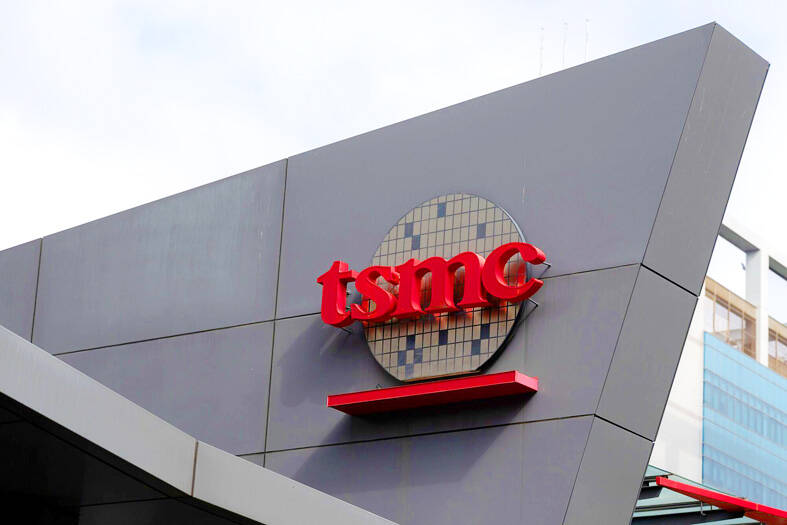Taiwan Semiconductor Manufacturing Co (TSMC, 台積電), the world’s largest contract chipmaker, plans to sign a memorandum for comprehensive collaboration with Japan’s Kyushu University covering training and joint research on semiconductors, the **Yomiuri Shimbun** reported yesterday.
TSMC is expected to hold seminars at the university and the two plan to conduct joint studies and write papers together, the newspaper cited sources close to the university as saying.
They are also considering an internship program, under which Kyushu University students would be dispatched to TSMC operations in Taiwan, it said.

Photo: Mike Kai Chen, Bloomberg
The agreement would be TSMC’s first of its kind with a Japanese university after the chipmaker launched its first semiconductor manufacturing fab in Kumamoto Prefecture in late February as it aims to improve chip supply resilience and help revive Japan’s semiconductor industry.
The Kumamoto fab is slated to start mass production in the fourth quarter of this year, and TSMC plans to build a second fab in the prefecture — with partners Sony Semiconductor Solutions Corp, Denso Corp and Toyota Motor Corp — which is scheduled to start operations by the end of 2027.
With TSMC’s arrival, Kyushu, where Kumamoto Prefecture is situated, is expected to see a shortfall of 1,000 technical experts in the semiconductor industry per year over the next decade, the **Yomiuri Shimbun** said.
To ensure sufficient talent for its operations, TSMC believes it is necessary to work with Kyushu University, it said.
Separately, Japan and the US are to announce closer cooperation in high-tech areas such as artificial intelligence (AI) in a joint statement when Japanese Prime Minister Fumio Kishida meets with US President Joe Biden this month, the **Asahi Shimbun** reported on Saturday.
Biden is set to host Kishida for an official visit to the US on Wednesday next week.
Calling ties between the allies a "global partnership," the joint statement is to advocate stronger cooperation in AI and semiconductors, **Asahi** said without citing its sources.
As part of the agreement, Japan and the US would likely set up a framework for AI research and development, working with Nvidia Corp, Arm Holdings PLC and Amazon.com Inc, among others, the newspaper said.
The US has moved aggressively in the past few months to halt shipments of advanced AI chips to China, in its efforts to stop Beijing from getting cutting-edge US technology that could strengthen its military.

SETBACK: Apple’s India iPhone push has been disrupted after Foxconn recalled hundreds of Chinese engineers, amid Beijing’s attempts to curb tech transfers Apple Inc assembly partner Hon Hai Precision Industry Co (鴻海精密), also known internationally as Foxconn Technology Group (富士康科技集團), has recalled about 300 Chinese engineers from a factory in India, the latest setback for the iPhone maker’s push to rapidly expand in the country. The extraction of Chinese workers from the factory of Yuzhan Technology (India) Private Ltd, a Hon Hai component unit, in southern Tamil Nadu state, is the second such move in a few months. The company has started flying in Taiwanese engineers to replace staff leaving, people familiar with the matter said, asking not to be named, as the

The prices of gasoline and diesel at domestic fuel stations are to rise NT$0.1 and NT$0.4 per liter this week respectively, after international crude oil prices rose last week, CPC Corp, Taiwan (台灣中油) and Formosa Petrochemical Corp (台塑石化) announced yesterday. Effective today, gasoline prices at CPC and Formosa stations are to rise to NT$27.3, NT$28.8 and NT$30.8 per liter for 92, 95 and 98-octane unleaded gasoline respectively, the companies said in separate statements. The price of premium diesel is to rise to NT$26.2 per liter at CPC stations and NT$26 at Formosa pumps, they said. The announcements came after international crude oil prices

DOLLAR SIGNS: The central bank rejected claims that the NT dollar had appreciated 10 percentage points more than the yen or the won against the greenback The New Taiwan dollar yesterday fell for a sixth day to its weakest level in three months, driven by equity-related outflows and reactions to an economics official’s exchange rate remarks. The NT dollar slid NT$0.197, or 0.65 percent, to close at NT$30.505 per US dollar, central bank data showed. The local currency has depreciated 1.97 percent so far this month, ranking as the weakest performer among Asian currencies. Dealers attributed the retreat to foreign investors wiring capital gains and dividends abroad after taking profit in local shares. They also pointed to reports that Washington might consider taking equity stakes in chipmakers, including Taiwan Semiconductor

A German company is putting used electric vehicle batteries to new use by stacking them into fridge-size units that homes and businesses can use to store their excess solar and wind energy. This week, the company Voltfang — which means “catching volts” — opened its first industrial site in Aachen, Germany, near the Belgian and Dutch borders. With about 100 staff, Voltfang says it is the biggest facility of its kind in Europe in the budding sector of refurbishing lithium-ion batteries. Its CEO David Oudsandji hopes it would help Europe’s biggest economy ween itself off fossil fuels and increasingly rely on climate-friendly renewables. While